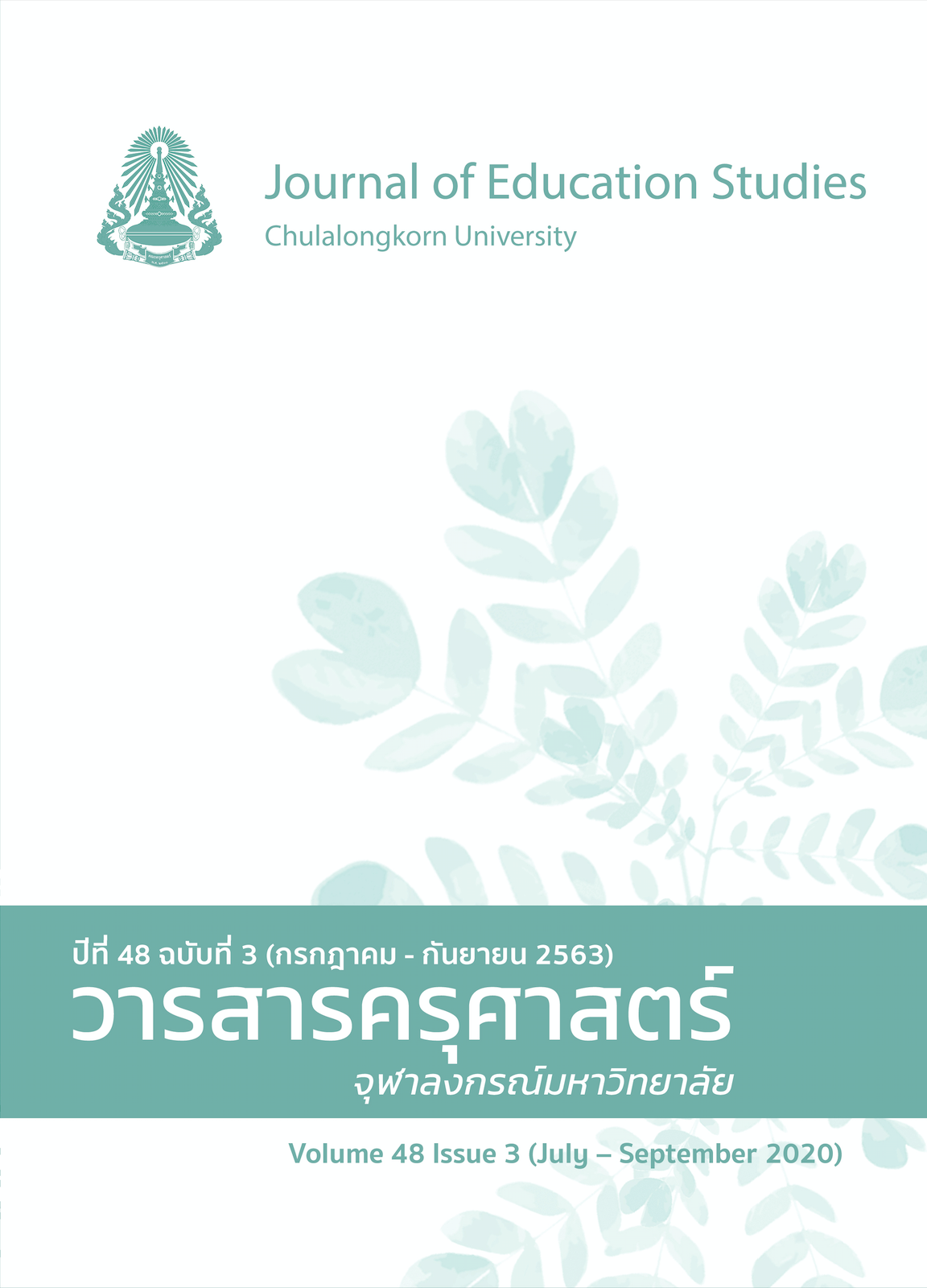The Participatory Development Process of a Problem-based Non-formal Learning to Enhance Restorative Conflict Resolution Skills for Juvenile in Slums
DOI:
https://doi.org/10.14456/educu.2020.41Keywords:
non-formal education, restorative conflict resolution, participatory learning process, juvenile in slum, problem-based learningAbstract
The objective of this research was to conduct the participatory development process of a problem-based non-formal learning to enhance restorative conflict resolution skills for juvenile in slums. The methodology consisted of four steps namely, 1) the survey of needs of conflicting parties and involving people, reflection and discussion, 2) the selection of conflict resolution, 3) the observation, and 4) the evaluation. The participants of this study consisted of a pair of conflicting juveniles, involving 9 people namely friends, community members and 6 leaders. The setting was Wat Pho Riang community and Wat Amphawa community, Bangkok. The results of this study indicated that the juvenile conflicting pair and involving people exchanged their attitude, experience, and made collaboration work to achieve the goals by being open-minded. Thus, they had a chance to experience self-change and reduction of being themselves which led to successful implementation.Then the researcher synthesized results from the process. This process was based on the beliefs in the potential of juveniles in slums to learn the ways to change themselves for achieving self-resolution. The learning process consisted of five steps as follows: 1) Critical Reflective Practice, 2) Creative Planning, 3) Understandable Communication, 4) Participatory Change, and 5) Conclusions.
References
กรมพินิจและคุ้มครองเด็กและเยาวชน. (2556). สถิติคดีย้อนหลังระหว่างปี พ.ศ. 2551-2554: จำนวนคดีเด็กและเยาวชนที่ถูกดำเนินคดีโดยสถานพินิจฯ ทั่วประเทศจำแนกตามสาเหตุของการกระทำผิด. http://www2.djop.go.th/stat/upload/6back_cause.pdf
จุฑารัตน์ เอื้ออำนวย. (2548). กระบวนการยุติธรรมเชิงสมานฉันท์: การคืน “อำนาจ” แก่เหยื่ออาชญากรรมและชุมชน. สำนักงานกองทุนสนับสนุนการวิจัย.
นภา หลิมรัตน์. (2546). รูปแบบการเรียนรู้โดยใช้ปัญหาเป็นฐาน [เอกสารอัดสำเนา]. ม.ป.ท.
ศูนย์ส่งเสริมการศึกษาตามอัธยาศัย กรมการศึกษานอกโรงเรียน. (2542). การจัดการศึกษานอกระบบเพื่อการศึกษาตลอดชีวิต ตามแนวพระราชบัญญัติการศึกษาแห่งชาติ พ.ศ. 2542. ม.ป.ท.
สำนักงานคณะกรรมการการศึกษาแห่งชาติ. (2541). การปฏิรูปการเรียนรู้ตามแนวคิด 5 ทฤษฎี. ไอเดียสแควร์.
สำนักงานเลขาธิการสภาการศึกษา. (2550). การจัดการเรียนรู้แบบใช้ปัญหาเป็นฐาน. นานมีบุ๊คส์.
สิริลักษณ์ แก้วยงยศ. (2532). ชุมชนแออัด ตะลอนบางกอก. รุ่งเรืองการพิมพ์.
สุมาลี ชัยเจริญ. (2551). เทคโนโลยีการศึกษา: หลักการ ทฤษฎีสู่การปฏิบัติ. มหาวิทยาลัยขอนแก่น.
สุมาลี สังข์ศรี. (2546). การจัดการศึกษานอกระบบโดยวิธีการศึกษาทางไกลเพื่อส่งเสริมการศึกษาตลอดชีวิต. มหาวิทยาลัยสุโขทัยธรรมาธิราช.
อุดม เชยกีวงศ์. (2545). หลักสูตรท้องถิ่น: ยุทธศาสตร์การปฏิรูปการเรียนรู้. บรรณกิจ.
อุ่นตา นพคุณ. (2546). กรอบแนวความคิดการพัฒนาโปรแกรมการมีส่วนร่วมทางการศึกษานอกระบบโรงเรียน. ชวนพิมพ์.
ภาษาอังกฤษ
Barell, J. (2007). Problem-based learning an inquiry approach (2nd ed.). Corwin.
Coombs, P. H. (1973). Non-formal education for rural development: Strengthening. International Council for Educational Development.
Kolb, D. A. (1984). Experiential learning: Experience as the source of learning and development. Prentice Hall.
Mathews, J. (2007). Problem-based learning and adult English language learners. Center for Applied Linguistics.
Van, N. D., & Croker, C. (2003). Restorative justice: Overview of for the network. Centre for Justice & Reconciliation. http://www.restorativejustice.org/RJ_City/01-03/rjcity_default.htm
Downloads
Published
How to Cite
Issue
Section
License

This work is licensed under a Creative Commons Attribution-NonCommercial-NoDerivatives 4.0 International License.




